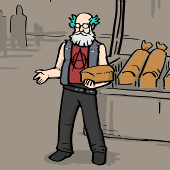Under a review of a book that helpfully informs us that revolutions are authoritarian. 
“Authoritarianism,” he writes, “is one of the most striking features” of revolutions. Napoleon was an archetype, followed by a grim parade of successors: “Stalin, Mao, Castro, Ho Chi Minh, Pol Pot … Khomeini.”
…
“The principle of popular sovereignty could be disregarded in the name of the people,” Mr. Edelstein writes. “It was in the name of a future, improved democratic government by people Y that the present, inferior democratic government by people X must be suspended.” Ancient despots had promised order. Modern despots were empowered by the allure of so-called historical progress, to be achieved with terror and coercion. The hiss and thud of the guillotine, the gutters running with blood, the show trials and purges, the inevitable dictatorships of “virtue” or the “proletariat”: These were not failures, Mr. Edelstein suggests, but the necessary if exorbitant price of progress.
…
“The inevitable compromises of democratic governance,” he writes of our present moment, “do not sit easily with either progressives or traditionalists. Liberal democracy gets worn down by historical expectations or regrets.” This general ennui produces perilous effects: a taste for centralized power, distain [sic] for procedural justice, aggressive ideological purity, contempt for moderation. Whatever his intentions, Mr. Edelstein may find that his study of revolutions induces in readers an appreciation for the age-old, Polybian balance of the U.S. Constitution, even as history threatens to overtake it. We should certainly hope so.
The ultimate troll response here would be “Yes, just look at the American Revolution, it was so authoritarian it brought slavery and massacres of the natives.”
That was my first thought too, but of course they logic their way out of that with some classic American exceptionalism.
The American Revolution was of a different quality. It emerged from the British tradition of mixed constitutionalism and what Mr. Edelstein calls “radical conservatism.” “Rather than transforming their world,” he writes, Americans “wished above all to preserve the state.” For Adams, Madison and Hamilton pure democracy and revolution remained threats. The American constitution thus sought to manage class conflict and balance governmental powers, both federally and within the central government. Americans, the author avows, were “the last of the Polybians.” The American Constitution, in this interpretation, emerges as an antirevolutionary document designed to frustrate radical progressives. This echoes an anguished cry frequently heard from the political wings, both now and in the past. Mr. Edelstein is at times sympathetic. He writes of the “gnawing tension between our political structures and our political sensibilities” and of a constitution designed to inhibit “swift and extensive political change.” Americans are “moderns living in a world made by ancients.” One can imagine the likes of Elizabeth Warren, Alexandria Ocasio-Cortez or Steve Bannon nodding along.
Oh…“different quality” right.

Yeah I’ve heard it argued that the American Revolution wasn’t really a revolution, it was more akin to a corporate spinoff from Britain.
Mixed… constitutionalism…?

I’ve honestly come to believe that if you are mainly concerned with “authoritarianism” and not “will my children get hatecrimed” or “is it possible for me to get sick and not have my life ruined for it” then you are not a serious person. Get a life. The state is oppressive, people wield power to meet political goals, sometimes they’re good goals and sometimes they’re bad. Sometimes they do it for the rich, sometimes for the workers. Sometimes they send the cops to protect the Klan, sometimes they send the cops to arrest billionaires for poisoning the water supply. Am I seriously supposed to believe that nothing good will ever come from using state power?
I like to cite China’s life expectancy chart and the ways people handwave that are fascinating. “Oh, so that’s what’s most important to you?” I mean . . . literally what else is there?
Evil AUTHORITARIAN China is FORCING people to live longer!
If your life is made worse by the system you don’t need some nebulous 5 dollar word to articulate it. Look at the price of insulin, dawg. Look at what insulin is. Pay or die!
Yes. If you are rich any use of government power represents a possible infringement on your right to exploit others so yes. As we are obliged to listen to rich people here in American we are forced to assume that is so.
People that are comfortably well off are content to continue the status quo, story at 11
Oh, I know, but it’s especially satisfying to hate these people and I thought the “I know better than those fools” combined with “Communists are still in power in Russia” was very funny.
The comments pictured really just demonstrate that they don’t understand power dynamics and cannot imagine themselves not in the position of the more dominant superpower.
On the other hand dying on the altar of the market, living by the market word and dying by the market indifference is not totalitarianism, despite capitalists monetizing even relationships we have
I assume we get to turn on the centrists first? I can’t wait. I don’t care what happens after that.
We’d never turn on them because they’d never side with us in the first place. They’d all join the fascists.










